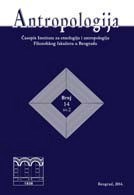MORGANOVA NAUČNA TEORIJA, NACIONALNA IDEOLOGIJA I POLITIKA SAVEZNE VLADE SAD PREMA INDIJANCIMA U XIX VEKU
MORGAN’S SCIENTIFIC THEORY, NATIONAL IDEOLOGY,
AND FEDERAL INDIAN POLICY IN THE 19TH CENTURY
Author(s): Gordana GorunovićSubject(s): Cultural Anthropology / Ethnology, History and theory of sociology, Identity of Collectives
Published by: Институт за етнологију и антропологију
Keywords: L. H. Morgan; social evolutionism; savagery and civilization; the „cult of the Vanishing American“; „Manifest Destiny“; Indian tribalism; assimilation policy;
Summary/Abstract: Lewis Henry Morgan (1818–1881) was the main representative of the theory of socio-cultural evolution of humanity in North American ethnology, and the most influential ethnologist in the second half of the 19th century in the United States. Under his influence, ethnography emerged as an important and influential field of research in American science. However, by the beginning of the 20th century, his scientific theory of human progress was discredited as an ethnocentric and even implicitly racist. The doctrine of biological, racial determinism, which was dominant in scientific thought during the nineteenth century, replaced the doctrines of cultural relativism and historical particularism, represented by a new generation of professional American anthropologists led by Franz Boas. This is a review of how and why this happened.
Journal: Antropologija
- Issue Year: 19/2019
- Issue No: 1
- Page Range: 119-140
- Page Count: 22
- Language: Serbian

